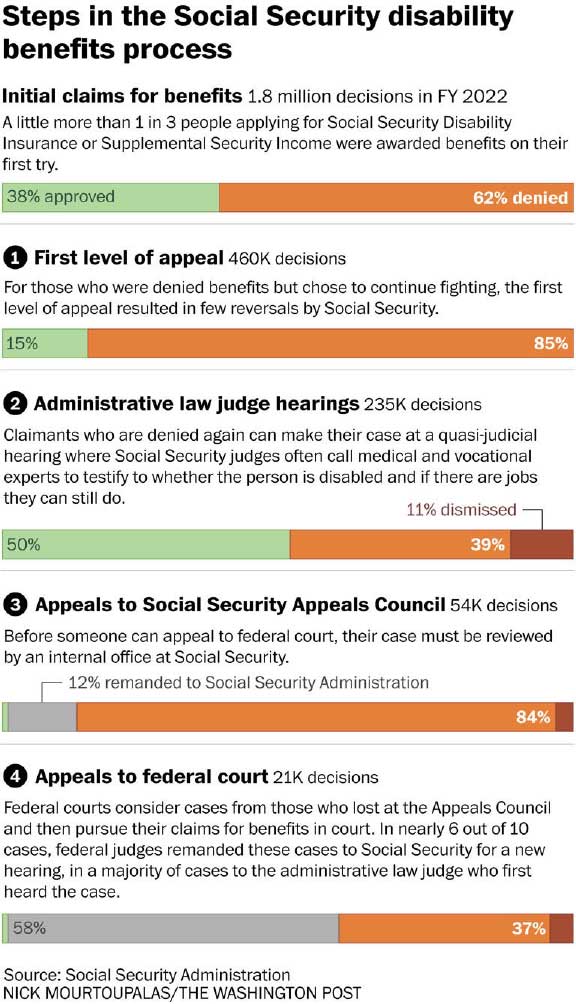Article Source: The Washington Post | By Lisa Rein
Published May 25, 2023

Hurled from a road-paving machine, Michael Sheldon tumbled 50 feet down a Colorado slope and struck a mound of boulders headfirst on a summer day in 2006. After eight surgeries to his head, neck and spinal cord, his debilitating headaches, chronic pain and post-traumatic stress have made it impossible to return to his work preparing roads for new subdivisions.
Yet for more than a decade, the Social Security Administration repeatedly denied Sheldon’s full claim for disability benefits that would pay him $1,415 a month. Even after three federal judges found significant errors with how his case was handled and sent it back to Social Security for new hearings, the agency continued to reject Sheldon, court documents show.
“They’ve done everything to prolong this to get me to quit,” he said after testifying in March at his fifth hearing. Now 59, he lives with his wife in a trailer in Cortez, Colo., and depends on food stamps and state benefits for the indigent. “I can’t replace the battery on a vehicle. Why has this taken 14 years?” Like Sheldon, thousands of other disabled Americans battle for years for benefits, even after federal courts rule in their favor.
Appeals for Denied Benefits Found Fault with Almost 6 in Every 10 Cases
In the last two fiscal years, federal judges considering appeals for denied benefits found fault with almost 6 in every 10 cases and sent them back to administrative law judges at Social Security for new hearings — the highest rate of rejections in years, agency statistics show. Court remands are on pace to reach similar levels this year.
Federal judges have complained of legal errors, inaccurate assessments of whether claimants can work, failures to consider medical evidence and factual mistakes, according to court rulings and Social Security’s own data. The scathing opinions have come from district and appellate court judges across the political spectrum, from conservatives appointed by President Ronald Reagan to liberal appointees of President Barack Obama.
Northern California District Court Judge Susan Illston, appointed by President Bill Clinton, wrote in January that a disability claim denied by Social Security that ignored key physician records was “so vague as to be essentially unreviewable.” The judge reversed the decision and ordered the agency to pay benefits to the claimant, a woman who suffers from delusions, depressive disorder and schizophrenia.
Approval rates for benefits are down at every level of review, Social Security data show, even as the number of disabled people applying dwindled during the coronavirus pandemic. Fewer than 20 percent of those who lose their appeal at Social Security take their claim to federal court, as most lack the time or resources to keep fighting.

“The system has become one of ‘how do we deny this claim’ rather than ‘what is the right answer in this person’s case?’” said Ann Atkinson, Sheldon’s attorney outside Denver. “And the federal court is agreeing with us: ‘You have to do a better job.’”
High Rate of Rejections
The high rate of rejections for cases handled by administrative law judges and the attorneys who write their decisions is driven by stringent monthly quotas set by Social Security officials and growing pressure to deny more cases, according to current and former officials, audits and attorneys who represent the disabled. The agency’s policies have been reshaped to give less deference to the expertise of doctors who, in some cases, have treated claimants for years, and its policies routinely depart from federal appellate court rulings.
The result has been an unmistakable shift to an adversarial disability system, advocates for the disabled claim: rather than calling the case down the middle, they say, Social Security has stacked the cards against the approximately 2 million people each year who apply for help when they can no longer work. Yet federal judges rarely order the agency to approve claims in deference to the government, but instead must typically refer the cases back to the administrative law judges — often the very ones responsible for the errors in the first place, a common practice in administrative law that avoids asking a new judge to rehear a complicated claim. Only about half of the agency judges assigned to rehear cases they initially denied reverse those rulings, prolonging the cycle of appeals and new remands for disabled claimants, few of whom have means to support themselves, a Washington Post analysis found.
“Some of them just dig in and say, ‘I’m going to find a way to deny this claim again,’” said Steven Weiss, regional managing attorney at Bay Area Legal Aid in Oakland, Calif.
Nicole Tiggemann, a Social Security spokeswoman, disputed that the system has overly tilted against disabled people. “The agency evaluates the totality of the evidence and decides cases based upon the issues and evidence in the particular case,” she wrote in an email. “The process has always been and continues to be non-adversarial.”
Yet the rate of cases remanded to the agency from federal judges has long been a source of alarm inside Social Security, current and former officials said. For the last decade, roughly half of all cases that made it to federal courts have been sent back. Under a law known as the Equal Access to Justice Act, the government paid attorneys of claimants who prevailed in federal court $68 million in fiscal 2022, the largest number of awards of any federal agency and more than triple the sum a decade ago, data from the Administrative Conference of the United States shows.
“It’s absolutely much higher than it should be,” said Asheesh Agarwal, Social Security’s chief lawyer during the first two years of the Trump administration. Given the stakes for disabled people and taxpayers, he argued, administrative law judges must do a better job deciding cases. “There’s a lot of money at stake when you think of a grant of lifetime benefits.”
Social Security spokesman Mark Hinkle in an email defended the system, noting that disability decisions appealed to federal court “constitute a very small fraction of the overall decisions issued by the agency.”
The Agency’s Own Lawyers are Increasingly Admitting Error Before Proceedings Begin
Hinkle acknowledged that “despite our consistent efforts to ensure quality decisions, the federal courts may remand decisions for further action.” He said that since courts rarely reverse the decisions of Social Security judges outright, “the agency is not directed to issue a decision in favor of the claimant” but must only “consider” new evidence — circumstances like age, a changed medical condition “and any specific action or analysis directed by the court.” While Social Security officials defend the rate of court remands, current and former officials said that the agency’s own lawyers are increasingly admitting error before proceedings begin in federal court. Government attorneys frequently ask district courts to remand an appeal before the claimant’s attorney submits a written brief, a practice that spiked during the pandemic as the agency fell behind.
“They recognize right away that some of these cases aren’t defensible,” said Cody Marvin, a Chicago-based disability attorney who frequently takes cases to federal court. He estimated that 40 percent of the claims his firm appeals to district court judges are returned to Social Security in what are known as voluntary remands. The numbers vary by state, but Social Security acknowledges some degree of error in at least 15 percent of cases, officials said.
Administrative law judges and their representatives also acknowledge that the system is flawed. Som Ramrup, president of the organization that represents 1,084 Social Security judges not in management, cited the sustained imposition of monthly case quotas as the “number one reason” behind the high rate of remands. Each judge schedules up to 600 cases a year, according to Ramrup and other administrative law judges.
“The judges strive to issue quality decisions, but they certainly are encouraged to rush,” Ramrup said. “When you’re rushing, it’s not going to be perfect. It’s a business decision [by the agency] to say, ‘that’s an acceptable remand rate to us.’”
Disabled claimants, meanwhile, can spend years battling for benefits, only to see victories in federal court rejected by Social Security after follow-up administrative proceedings. After a Colorado district court found in 2020 that an administrative law judge had erred in denying benefits to Heather Fowler, her claim was returned to the same judge — who reached the same conclusion after a second hearing.


